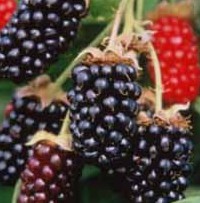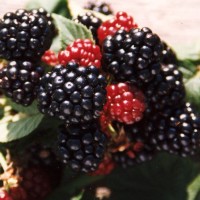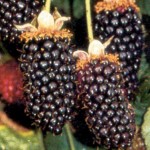Blackberries


Black Butte
A newly named Cultivar from the Oregon State/USDA-ARS program. This variety has a very large, good flavored fruit but is not a replacement for Marion. It will probably be best suited for home garden and local fresh market. This variety probably requires chilling (not good for southern and central valley California).
Thornless Boysen
Trailing. Developed in California. Very large, almost seedless, sweet, juicy, full-bodied flavor. Good for fresh eating, freezing, jams, preserves, pastries, juice, syrup, and wine. To soft for shipping. Ripens during May and June. Thornless forms of all blackberries should not be cultivated deeply as damaged feeder roots will send up an occasional sticky sucker that has to be removed.
Boysenberry
Trailing. The Boysen originated in California and introduced in 1923. Very large, non-shiny, dark maroon berries. Soft, very juicy flesh. The Boysen has a distinctive, rich, tangy flavor and very aromatic. Excellent for eating fresh, juice, freezing, canning, pastries, and preserves. Ripens about July 1, and are among the largest of the small fruits. Vigorous, trailing vines. Boysenberries are hardy to approximately -10 degrees F. without protection.

Thornless Chester
Semi-Erect. Thornless variety. Large, sweet, high quality berries with good flavor. Excellent for fresh eating, jams, jellies, and pies. Flowers same time as the Hull Blackberry, but ripen about 10 days later. The Chester is most resistant to Cane Blight caused by Botryosphaeria Dothidea. Performs well in the deep South. Will not soften or lose color on hot, sunny days. Ripens in August.
Thornless Loganberry
Trailing. Originating in California, the Logan is thought to be a natural cross between a California native blackberry and a red raspberry. The berries are long, large, dark red, acid, and highly flavored. The Logan is often used for pies, juice and wine. Not as widely grown commercially as it once was. There is high demand for it in the home garden due to its desirable flavor. Thornless canes; average yields. Hardiness is similar to Boysen.
Lockness
Thornless. Patented variety from the National Seed Development Organization in Scotland. Lockness should become one of the very best all time thornless blackberries for the home garden. Unlike many other types of blackberries, Lockness does not produce thorny canes from root system . Lockness is truly thornless. It is extremely productive. Lockness has similar genealogy to Black Satin, Hull, and Chester, but Lockness is a much better tasting berry and has real gourmet quality. Canada’s top small fruit specialist has tested Lockness at British Columbia Abbotsford Fruit Testing Station and gives it the highest rating for a berry of this type.
Olallie
Trailing. Developed in Oregon, But produces extremely well in California where the lack of day length and cold limit the productivity of some blackberries. Large, shiny, firm black berries. Sweet with some wild blackberry flavor. Vigorous and productive trailing thorny canes. Ripens in July. Good for fresh eating, jams and freezing.

Siskiyou
Trailing. Tested as orus 830-4, selected from the cross of ORUS 2027 (Ollalie x ORUS 1367) x ORUS 1826 (ORUS 1122 x ‘Boysen’) ‘Siskiyou’ is outstanding in its vigor, disease resistance and winter tolerance. Canes are more thorny than Marion but less than Kotata. Fruits are very large, firm and excellent flavored, produced early in the season before Kotata and with Black Butte. Yields have been similar to Kotata, less than Marion and greater than Black Butte.
Tayberry
Trailing. Introduced by Scottish Horticultural Research Institute. Named after the River Tay in Scotland. Tayberry was bred from a cross between the blackberry Aurora, a high quality variety bred in Oregon, USA and an improved Tetraploid Raspberry from the breeding program at the Scottish Corp. Research Institute. Tayberry is ready for picking from early July through mid August. Long, moderately vigorous canes. Berries are large, long conical shape and a reddish purple color with excellent, slightly aromatic flavor. Excellent quality for freezing, canning, jams, and jellies. Tayberry has shown considerable promise for the fresh fruit and processing markets.
Triple Crown
Thornless - Named for its three crowning attributes: flavor, productivity and vigor. Large, firm and flavorful berries. Can produce up to 30lbs of fruit per vine. Great for fresh use and canning. Long, semi-trailing canes require support. Highly adaptable. Summer harvest. Self-fruitful.